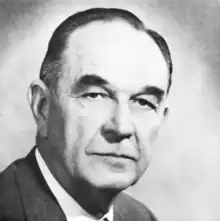R. Stanton Avery
R. Stanton Avery (January 13, 1907 – December 12, 1997) was an American inventor,[1] most known for creating self-adhesive labels (modern stickers). Using a $100 loan from his then-fiancé Dorothy Durfee, and combining used machine parts with a saber saw, he created and patented the world's first self-adhesive (also called pressure sensitive) die-cut labeling machine. In 1935, he founded what is now the Avery Dennison Corporation.[2][3]
Ray Stanton Avery | |
|---|---|
 R. Stanton Avery in 1974 | |
| Born | January 13, 1907 Oklahoma |
| Died | December 12, 1997 (aged 90) |
| Nationality | American |
| Other names | Stan Avery, Stan the Sticker Man |
| Education | Bachelor of Arts, Pomona College, 1932 |
| Occupation | Businessman/Inventor |
| Employer | Avery Dennison Corporation |
| Known for | Invention of the resealable sticker, philanthropic donor, trustee of nonprofit organizations |
| Spouses | Margaret Lolhker (m. 1932)Dorothy Durfee, c. 1935
(died 1964)Ernestine Onderdonk
(m. 1965; died 1997) |
Avery served as chairman of the board of trustees of California Institute of Technology, and was a member of the board of trustees of the Huntington Library and the board of trustees of the Los Angeles County Museum of Art.[4][3]
Avery House at Caltech is named after him.
Early life
Ray Stanton Avery was born on January 13, 1907, in Oklahoma City. Avery lived in a rented chicken coop and worked at the Midnight Mission as a clerk in order to put himself through college.[5]
Education
After dropping out for a year to live in China, Avery graduated from Pomona College with a humanities degree in 1932. He was a member of the Kappa Theta Epsilon fraternity and a member of the "Oriental study expedition", a group of men from Pomona College who traveled to the Orient and spent about a year there before returning to the college.[6]
Stickers
National Sticker Day is celebrated on January 13, in honor of R. Stanton Avery, who was born on that day. While gum paste (requiring moistening) had been used on labels since the 1880s, R. Stanton Avery is credited with creating the first pressure-sensitive sticker (self-adhering without moistening) in 1935.[4][7][8][9][10][11][12][13]
Philanthropy
Stan Avery donated generously to educational and arts institutions. He was known for philanthropy in Southern California, having supported the California Institute of Technology, the Los Angeles County Museum of Art and the Huntington Library.
In 1996, Avery created Avery House at Caltech, a residence housing undergraduates, graduate students and faculty.
Personal life
Avery married Margaret Lolhker on August 6, 1932. Lolhker, his first wife, was also a graduate with honors of Ponoma College, just as Avery was.[6]
See also
- Dunbeath Castle, purchased by Avery in 1976.
References
- "Avery, R. Stanton". American National Biography Online. Oxford University Press. (subscription required)
- "A History Shaped By Values". Avery Dennison. Retrieved July 5, 2018.
- "R. Stanton Avery 1907–1997". Engineering & Science. California Institute of Technology. 1997.
- "R. Stanton Avery, 90, Inventor and Producer of Self-Sticking Labels". The New York Times. December 22, 1997.
- R. Stanton Avery (1997-12-13). "R. Stanton Avery; Label Firm Founder". Los Angeles Times. ISSN 0458-3035. Retrieved 2017-01-12.
- "Margaret Lolhker, Ray Stanton Avery United in Marriage". The Pomona Progress Bulletin. August 9, 1932.
- "Who Invented Stickers?". Wonderopolis. Retrieved 25 July 2019.
- "National sticker day".
- "National Sticker Day".
- Le'Mia Spencer. "Stick to fun with stickers of all kinds".
- "Avery Dennison: Our History".
- "R. Stanton Avery -- The Inventor of Self-adhesive Labels".
- "He Might Have been Written by Horatio Alger: Some notes on R. Stanton Avery, new chairman of Caltech's Board of Trustees".